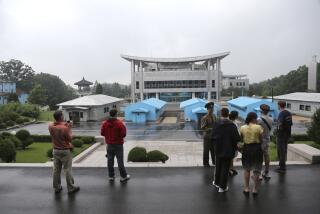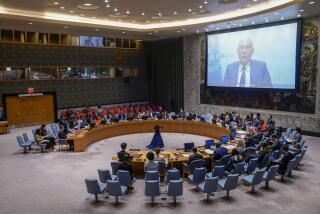Fear of Disease Puts N. Korea in Near-Lockdown
- Share via
SEOUL — Already one of the most xenophobic countries in the world, North Korea is virtually sealing its borders in an effort to prevent the insidious SARS virus from seeping through and overwhelming a barely functioning health-care system.
Government-run Air Koryo has told aid workers that it is suspending its twice-weekly flights between the capital, Pyongyang, and Beijing as of Tuesday. A strict quarantine has been imposed at land crossings with China. And ferry service with Japan has been curtailed.
Meanwhile, the cruise ship that carries tourists from South Korea to the resort of Mt. Kumgang in North Korea has been docked, forcing more than 10,000 people to cancel their visits and setting back the estranged countries’ reconciliation process.
In the last few days, various foreign dignitaries, ranging from an Australian lawmaker to a prominent South Korean political broker, have been politely told: Don’t come.
Even outsiders bringing desperately needed humanitarian aid are being turned back.
“They are pretty much closing off the country,” said Gerald Bourke, a spokesman for the World Food Program’s office in Beijing. He said he expects North Korea to cancel all of its international flights -- including those to Beijing, which are its main link with the outside world -- except for weekly service through Vladivostok in the Russian Far East.
North Korea’s new regulations are believed to be the toughest of any country in the world. The government is imposing a 10-day quarantine on visitors coming from any country that has had a single suspected case of severe acute respiratory syndrome.
Diplomats and international employees are not exempt. U.N. employees who arrived Saturday from Beijing were expected to be sent to a government guest house in Anju, 60 miles north of Pyongyang, for 10 days before being allowed to resume their jobs. South Korean officials who participated in ministerial-level talks last week in Pyongyang could not get off the airplane until they provided health certificates and had their temperatures taken. Once in Pyongyang, they were not permitted to leave their hotel.
“If this disease were to spread in North Korea, it would be disastrous. There is not enough medical staff or medicine. That’s why the North Korean government is very sensitive,” said Kim Jung Ro, a spokesman for the South Korean Unification Ministry.
Bourke said the chronic food shortages in North Korea could make its population more susceptible than others in Asia to an epidemic.
“You have millions of very weak people, a health-care system that is deficient, and if you got SARS in there, it could cause major, major problems,” Bourke said.
“That’s why they are using every tool at their disposal to keep out the disease.”
Yet those efforts could exact as high a human cost as the virus -- a classic case of the cure being worse than the disease. North Korea is unable to produce enough food to feed its people, making it dependent on the humanitarian aid that is increasingly arriving by sea.
A South Korean shipping official who asked not to be quoted by name said there are concerns that vessels carrying aid to North Korea might not be able to make the trip because of the strict quarantine rules.
Alex Shim, a general manager of Hyundai Asan, which runs the tours to Mt. Kumgang, said the suspension of the trips has cost North Korea more than $1 million in tourism revenue.
North Korea has yet to report a single case of SARS, and health specialists say its isolation might be one reason.
More to Read
Sign up for Essential California
The most important California stories and recommendations in your inbox every morning.
You may occasionally receive promotional content from the Los Angeles Times.












